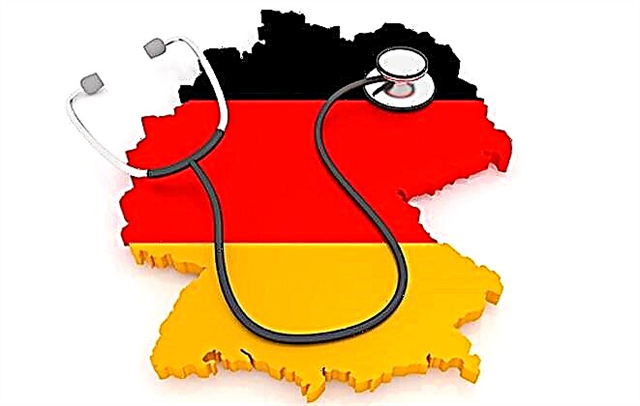Like all other German mechanisms, the healthcare system in the Federal Republic of Germany works with high precision and great efficiency. The principles of its accessibility and equality were laid down by Otto von Bismarck. It has evolved rapidly over the decades, evolving into one of the most advanced systems in the world. This is the main reason why treatment in Germany is in such great demand among patients with a wide variety of diseases.

A little about the level of German medicine
The reputation of advanced and effective German medicine has earned thanks to the government's interest in its development and a favorable environment for research and experimentation.
Every year, the medical industry receives funding from the state in the amount of 11% of GDP. Today it is almost 300 billion euros, which is spent on:
- introduction of advanced treatment methods;
- re-equipment of medical institutions;
- development of new drugs;
- stimulation of pharmaceutical production;
- the opening of rehabilitation centers.
Medicine in Germany is also a professional training of specialists who undergo long-term training, pass serious exams and practice on the basis of the best clinics in the country. In addition, the Federal Republic of Germany regularly monitors the quality of the work of the medical sector.
The effectiveness of diagnostics and treatment is also due to the use of a single electronic system, which stores information about everyone who has ever contacted German specialists. This allows the attending physician to see the complete clinical picture of a particular patient.
Treatment methods and technologies
All surgical and therapeutic procedures performed by German doctors comply with the protocols of the World Health Organization. All techniques are aimed at organ preservation and minimally invasiveness. It is worth saying that it was Germany that became the country where the first laparoscopic (without incisions) and endoscopic (through natural openings on the body) operations were performed.
This contributed to the accumulation of experience, which in modern realities allows:
- carry out radical treatment even in elderly patients;
- reduce the risk of complications after surgery;
- reduce the recovery period;
- to reduce the severity of side effects after interventions;
- achieve maximum aesthetic effect.
Treatment in Germany for children and adults begins with consultation and diagnosis. The main examination methods (depending on the disease) are:
- genetic diagnosis - allows you to establish a hereditary predisposition to certain diseases;
- histology - tissue biopsy is carried out using the latest reagents to detect changes that are indistinguishable with conventional light microscopy.
- ultrasound - most accurately detects pathological changes in organs;
- MRI - in many clinics, it is carried out on Tesla machines, it allows you to identify tumor diseases, vascular and heart pathologies, changes in other organs and systems.
- PET-CT - used in cancer research;
- scintigraphy - radionuclide diagnostics used for early detection of tumors.
Methods for treating diseases deserve special attention:
- impact on the body with stem cells allows you to replace or restore damaged organs and tissues, triggers anti-inflammatory and immunomodulatory processes;
- endoprosthetics - joint replacement;
- FUS ablation - often used for the treatment of uterine fibroids in gynecology, is based on focused ultrasound, guided by MRI;
- photodynamic therapy - used to treat skin diseases (psoriasis, dermatitis, fungus, borreliosis and others);
- brachytherapy is the latest technology that allows a radioactive element to be delivered directly to the tumor during irradiation;
- biological methods for the treatment of cancer with dendritic cells (made from the patient's blood) - today they successfully compete with chemotherapy and radiation. This technique is actively used by specialists of the university clinic located in Munich;
- the use of exoskeletons (treatment of the spine and the musculoskeletal system in general);
- performing operations using the latest surgical systems - the Da Vinci robot (for interventions that require the greatest precision, for example, in neurosurgery or for the removal of prostate cancer), a gamma knife (used in brain radiosurgery) and many others;
In the process of rehabilitation, healing natural properties (mineral springs and mud), physiotherapy, homeopathy are actively used.

Leading directions
The level of development of German medicine is extremely high, but not all diseases are worth going to this country. Here are the key areas of medical tourism in Germany:
- Oncology. Cancer treatment in Germany is based on cutting edge methods and the latest research findings. Particular success was achieved in the treatment of severe stages, as well as with a high resistance of cancer pathologies to modern drugs and techniques.
- Gastroenterology - it has long been recognized all over the world that diseases of the digestive tract should be treated in Germany. People come here with hepatitis C, stomach ulcers, chronic gastritis, chronic duodenitis, reflux esophagitis, gallbladder disease, intestinal dysbiosis and many other diseases.
- Cardiac surgery and cardiology. In German clinics, all diseases of the cardiovascular system are treated and the following procedures are performed: vascular stenting, valve surgery, coronary artery bypass grafting, surgery for heart septal defects, implantation of pacemakers, and others.
- Urology - patients with diseases of the urinary system, prostatitis, cancer pathologies apply here. Here, bladder prosthetics, laparoscopic operations, endoscopic laser stone crushing, and kidney transplantation are performed.
- Orthopedics - joint treatment in Germany is the most popular service among athletes. The most complex surgeries for endoprosthetics of knee and hip joints are performed here for deforming arthrosis, injuries, etc.
- Neurosurgery and neurology - local clinics provide assistance in the treatment of various types of pathology: craniocerebral trauma, myasthenia gravis, myopathy, stuttering, acquired and congenital anomalies of the nervous system, central and peripheral pain syndrome, circulatory disorders of the brain, etc. Spine treatment in Germany is carried out using the latest developments in medicine.
- Aesthetic medicine - such areas as reconstructive (removal of hemangiomas, gender reassignment, correction of leg curvature), burn medicine (including skin transplantation, restoration of mobility of knees, fingers, joints after burns), maxillofacial and plastic surgery are especially developed.
Select Germany is also necessary for those who are interested in the treatment of oncology, diseases of the vascular system (varicose veins, lymphedema, atherosclerosis, etc.) and transplantology. People come here for eye treatment, as well as for dental services (implantation, aesthetic dentistry, treatment of halitosis (bad breath).
Diagnostics in German clinics
Before a decision is made on the appropriate method of influencing a particular disease, the patient will have to pass several tests and conduct a comprehensive study of the body. Medical examination in Germany involves a wide variety of programs:
- basic diagnostics for women and separately for men;
- advanced diagnostics + MRI;
- search for cancers;
- neurological examination;
- diagnostics of urological orientation;
- program for the elderly and children;
- vascular diagnostics;
- orthopedic examination and many others.
Each program assumes a specific set of research methods. Most often these include:
- collection of anamnesis;
- analysis of urine, blood, feces;
- Organ ultrasound;
- MRI;
- gynecological or urological examination;
- consultation with a mammologist;
- dermatologist consultation;
- gastroscopy;
- colonoscopy.
German specialists offer patients over 35 years old to undergo an annual preventive examination according to the Check-up package, which involves a comprehensive examination of the body.

What operations are performed in Germany
Many patients choose German clinics due to their high technical equipment and the use of the latest surgical methods:
- "Da Vinci Robot" - performs operations in a small incision on the human body (1-2 cm). The installation tools allow for pelvic, heart and vascular, kidney and bladder surgery. Thoracic surgery in Germany is also performed with the participation of a Da Vinci robot. Many clinics in the country are equipped with it: "Mitte" in Essen, "Nord West" in Frankfurt, "Charite" in Berlin.
- Endoscopic surgeries are considered the most gentle interventions. They allow you to recognize the initial stages of diseases, do targeted biopsy, colonoscopy, remove polyps, perform gynecological operations, eliminate bleeding, remove stones, etc.
- Radiosurgical operations in Germany involve the use of a "cyber knife" - with its help, high-precision oncological operations are carried out. Allow to reduce the harmful effect on the body, irradiating directly the site of the tumor.
- Neurosurgery - specialists in this industry perform operations for ligament ruptures, brain injuries, brain neurooncology.
- Operations using a laser are used in oncosurgery, in the treatment of hemorrhoids, eyes, spine, removal of adenoids.
Where to go
If you are interested in treatment in the best hospitals in Berlin and other German cities, take a look at the following list:
- in Berlin one of the leading is the Charite University Hospital. It unites 100 institutes and clinics, which are grouped into 17 specialized centers. Half of the German Nobel laureates in the field of medicine work on the basis of this particular hospital. Key areas: otolaryngology, cardiology, transplantology, dermatology, pulmonology, gynecology.
The clinics Helios Berlin-Buch (the largest and most progressive in Berlin according to the Focus magazine in 2021), Vivantes, Mick and Meoclinic are also well known.
- Munich - The University Hospital of Munich is the most respected. It includes 45 institutes and centers. Leading areas: gynecology, neurology, cardiology, urology, surgery, ophthalmology. In addition, in Bavaria, the German Heart Center, the Ludwig Maximilian University Hospital, the Ludwig Bavarian Ophthalmology Clinic, and the Haunerschen Children's Clinic deserve attention.
- University Hospital Freiburg - includes 42 departments and 10 specialized centers and 11 institutes. It has the ability to accommodate about 1.5 thousand patients at the same time.
Other famous clinics in Germany:
- University Hospital of Hesse;
- University Hospital Frankfurt;
- Heart Clinic Bad Krozingen;
- clinic "Schwabing" (Munich);
- Axlepios Hamburg;
- Orthopedic center "Izar" and many others.
How much does the treatment cost?
Since 2003, prices for certain manipulations in the country have been calculated according to the unified DRG pricing system. It is important to understand that treating pancreas, allergies, and removing a brain tumor all come with very different budgets.
The approximate prices, current for 2021, are given in the table:
| Service | Price in EUR |
|---|---|
| Coronary artery bypass grafting | 18000-32000 and above |
| Heart valve replacement | 48000-65000 |
| Bowel resection | 16000-22000 |
| Knee replacement | 9000-22000 |
| Liposuction | 8000 |
| Bone marrow transplantation | 250000 |
| Dental treatment | from 850 |
| Surgery for varicose veins | 5500-6500 |
| Comprehensive diagnostics | from 1700 |
| Vertebral hernia resection | 11000 |
| Heart transplant | from 400000 |
German sanatoriums
Germany has natural resources to provide high-quality and effective treatment. These are mainly thermal and radon springs, mud, features of the local climate, sea water. All sanatoriums and resorts in Germany are divided into 9 categories, which allows patients to choose the right health resort.
Leading health centers are located in the following resorts:
| Resort area | Specialization |
|---|---|
| Baden Baden | problems in the work of the musculoskeletal system; respiratory system diseases, including tuberculosis; metabolic disorder; trauma; cardiac pathology; gynecological and andrological diseases; nervous system disorders |
| Wiesbaden | joint diseases; rheumatism; recovery after major surgeries; metabolic disorders |
| Berchtesgaden | migraine; allergies; sleep disturbance; upper respiratory tract infections |
| Bad Kissingen | disturbances in the work of the digestive system; respiratory diseases; deviations in the work of the musculoskeletal system; reproductive dysfunction |
| Bad Tolz | gynecological diseases; intervertebral hernia; visual defects; obesity, diabetes; lack of exercise |
Medical tourism in Germany is an important part of the German economy.

Pharmaceutical direction
There is no doubt about the quality of the drugs that are presented in German pharmacies. Everything is checked here, from raw materials entering production to packaging. Experts promise that by 2021 this state will become the third largest producer of medicines in the world.
Pharmacies and medicines in Germany are strictly controlled by the state. A pharmaceutical institution can only be managed by a specialist with the appropriate education and permission. Each pharmacy should have a laboratory, a prescription room and a consultation room.
You can also buy medicines online, but only those that do not require a doctor's prescription.
Organization of the trip
The organization of treatment in Germany begins with the choice of a medical institution. For this purpose, you can resort to the services of firms that provide such assistance. They take care of all the issues related to documentary support, selection of a clinic and a doctor, booking tickets and booking accommodation for the patient's relatives.
In this case, the amount of the total check can increase significantly, since you will have to pay commission, but this way you will save yourself from numerous organizational issues.
If you want to organize treatment in Germany without intermediaries, follow the following algorithm:
- Clinic selection.
- Sending a request for treatment. All medical documents must be translated into German.
- Choosing a program for staying in a medical institution.
- Receiving an invitation letter from the clinic.
- Payment for services.
- Purchase of tickets.
- Visa application.
You need to contact the consulate in advance, since additional documents may be required during the consideration of the request. And this takes time. To travel, you will need a German visa for category C treatment.
Outcomes
Treatment in Germany is chosen by those who want to get quality and result, but have enough funds for this, since you cannot call medical services cheap here. Leading directions: cardiology, transplantology, orthopedics, plastic and neurosurgery.











